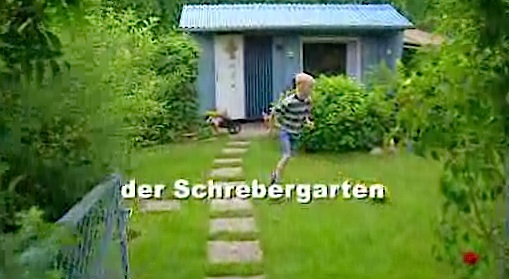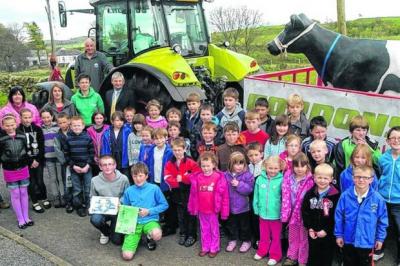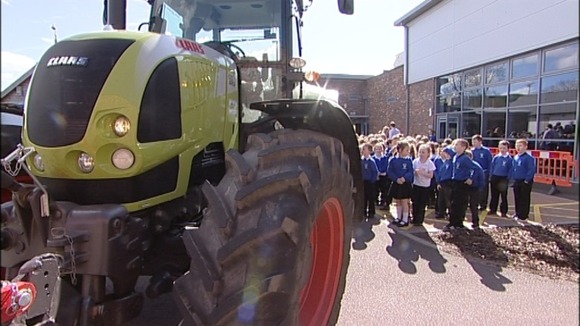Children need land

Lesley Riddoch and I enjoyed a packed session at the Nordic Horizons meeting on huts at the Festival of Politics this morning and the talk turned to how huts can be part of a revolution. Something of what this could entail is illustrated by watching this short film about two young boys spending time in their allotments and summer house.
The whole point of this post is to watch this video ……………………. click here to watch
(I am sorry – I can’t embed Flash video in WordPress.)
As close attention to the film will reveal and because Germany allows such urban hutting, children can grow up learning (with no need to be taught by a schoolteacher) about solar energy, growing their own food, rearing animals, building relationships with others, having substantial autonomy, expectations of equality and access to land and many other vital skills.
I am left wondering whether in fact whether such an upbringing contributes to Germany’s economic success. If girls and boys spend their childhood helping to build, maintain, manage and enjoy a small parcel of land upon which a community lives, they learn about empowerment, initiative, creativity, practical skills, relationships and so much more. A fascinating history of the schrebergarden movement can be found here including its legal basis in the land reforms following the 1918 revolution. There are over 1 million schrebergardens in Germany – four times the number of allotments in the whole of the UK (where if you dare to spend the night in your toolshed you could be evicted.)
Meanwhile the most that many of Scotland’s schoolchildren can expect is to get to go and visit a big estate or farm owned by an aristocratic landowner and be shown big tractors and and some animals.
The issues raised are very relevant to two Scottish Government initiatives at the moment. The first is he Land Reform Review Group (which has yet to publish its remit and about which little can sensibly be said until this is done). The second is the Community Empowerment and Renewal Bill consultation which specifically raises the future of allotment law and might yet be a vehicle for legalising the expansion of hutting.
UPDATE 19 August.
Daye Tucker, a Director of Scottish Land and Estates finds my dismissal of how we link children to the land “loaded and toxically inaccurate” and “rather insulting”. I admit it is a bit flippant but it is designed to point up a deeper truth in the comparison between Germany and Scotland. Give kids 2 months spent on a schrebergarden and they will learn a lot more about growing food that a Royal Highland Educational Trust visit to a school. Rather to prove my point here is a report about the Dumfries and Galloway branch of the RHET who seem to think that taking big tractors into playgrounds is going to teach children anything. Note that this is a German tractor which was almost certainly assembled by workers who had grown up on a schrebergarden. Oh, and just have a listen to Andrew Dunlop in the film clip.
UPDATE 29 August
The story would not be complete without revealing what those schoolchildren above are actually looking at. Whilst some of the boys at the back are admiring the big green tractor, the rest are looking quizically at ….. a plastic cow (photo taken at a different stop on the same tour).


Have not yet watched the film but for sure, children need land, indeed landless upbringing of children in Scotland is perhaps the greatest hindrance to us meeting our country’s potential.
Land reform Review Group has a massive responsibility right now, and, with the wasted land potential and people in need of it, could totally change collective prospects, ambitions and achievements beyond recognition.
Frankly, as a farmer I am somewhat sickened by the rather pompous education of our children, by the farming establishment, as to how and where food is produced, with not a consideration that perhaps most of those being brainwashed might yearn the slightest opportunity to be involved in the food producing environment and process themselves.
I grew up in a family of six on 27 acres. That 27 acres was the single most important element in shaping all our lives, directly and indirectly.
The dead hand of the planners and some educationalists will have to released it’s stifling hold before we can aspire to such utopia. Do ALL german families living in high rise flats enjoy this experience? “Meanwhile the most that many of Scotland’s schoolchildren can expect is to get to go and visit a big estate or farm owned by an aristocratic landowner and be shown big tractors and and some animals.” A loaded and toxically inaccurate statement which as one of the many farm owner occupiers, dedicated to supporting the work of the Royal Highland Education Trust I find rather insulting. Decades ago it was the farmers who recognised the increasing disconnect between people, the countryside and their understanding of where their food comes from, so began the regional Countryside Initiatives out of which RHET grew. The present Holyrood administration recognises RHET’s valuable work and sees it as an important element in the bigger picture of Land Reform. Rome wasn’t built in a day.
Kids visiting farms – all very nice. But what has RHET or anyone done to lobby for more allotments, community gardens, German schreber gardens etc.? Present Holyrood administration does not see farm visits as part of land reform – where is the evidence for that. They have not yet even defined what they mean by land reform. Rome wasn’t built in a day but Scotland has had a Parliament for over 10 years and nothing’s been done on many of these issues. Nothing was done to strengthen hutting laws and so Barry Don hutters were evicted. Now the same is happening at Coldingham. There’s a massive disconnect between the complacency of elite Scottish society and the expectations of so many folk in Scotland. This Autumn I hope that will begin to change.
There are over one million schrebergardens – that is FOUR times the number of pocket hankerchief allotments in the whole of the UK. See http://goo.gl/iekAL for social and political history. 1918 revolution and land reform provided legal basis.
Interesting film clip, powerful message.
We are fortunate to have a nature kindergarten in Perthshire. The preschool children are taught outside in all weathers (no such thing as bad weather, merely wear the correct clothing). They are taught how to make a fire, cook, how to use tools ie sawing, safety, growing their own food, recycling, nature studies, seasonal awareness, care of livestock as well as plenty of play and tree climbing.
There are a couple of huts as well as a communal kitchen where the children sit together around a table to eat or share ideas.
All this took was one lady with great foresight who recognised a demand, the rental of a 40 acre wood plus the trust of parents who felt that children need so much more than to be wrapped in cotton wool.
The children are happy, healthy and confident.
If more land was made available and school children encouraged to learn outdoors with the addition of proper agricultural/ horticultural lessons to the national curriculum, then we would be offering our children an invaluable and beneficial legacy.
Daye Tucker believes it ‘s Planning that has a sitfling hold……well that’s a good one!!!
It’s the lairds who have the sitfling hold . If there were more owner occupied farms around Scotland we would not be in this situation. The lairds do all within their powers (which is all ) to ensure there are no huts around the countryside. They want it all cleared so they can visit their estate perhaps twice a year. Have a look at what has happened on the island of Jura. There is an interesting blog on the closure of the Jura gardens by the new overseas laird. The last thing they want is to share it with others and have huts . Get rid of the lairds and you will go a long way to the goal you are looking for. Scotland is for all….power to the Hut. Let’s go for it and start a revolution.
Not everyone has a Schrebergarten here: unfortunately many are overgrown while many families can’t find one. Sometimes we don’t even know who owns them. They are sometimes on land that can’t be economically farmed but that doesn’t mean they are poor quality: ours is a former vineyard.
The rules for using the gardens vary depending on local byelaws and if the land is officially ‘urban’ or ‘rural’ but we are able to stay up to 21 days a year in ours (and in practice we could probably stay longer because no-one is looking that closely.
Andy, Thank you for your interesting response. Perhaps it is time to revitalise the Schrebergarten ideal.
I have a hut at Carbeth, this weekend my 9 year old daughter brought her school friend out to our hut. The girl had never sat by a bon-fire or been free to run and play in the woods, she had never had a night without plugging into the TV or computer. The smile was hardly off her face:- as we read stories, played games, and looked at the flames in the fire as night fell – all very simple pleasures, and at no cost – other than us having had the luck and good fortune to have a wee patch of land on which to build our simple little wooden hut. My daughter’s friend said to me, as we headed back to the city – how can I get a hut, everyone should have one.
We need to change the culture that puts these little patches of land out of reach and demand them as a necessity for the social and mental health of our children.
Thank you. This is an important debate and I am grateful for your profound observation.
I think there is a lobby in the UK which on the face of it works through planning policies to look after the countryside, but which also has the “unintended” consequence of boosting enormously the value of land awarded planning consent. It seems to me this supports the British pride in ever increasing property values. A variation on NIMYism really; who wants the value of their house to decrease? Germany seems to take a different approach to home ownership.